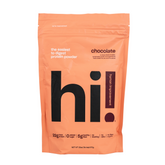You might think most proteins are complete, but most legumes, grains, nuts & seeds, and vegetables lack at least one essential amino acid critical for a number of critical body functions.
Complete proteins defined
There are 20 amino acids however 9 of them our bodies cannot produce on their own and have to come from our foods. Those are called “essential amino acids” (EAAs for short). Complete proteins contain all nine of the essential amino acid.
What are the 9 EAAs?
The 9 essential amino acids are histidine, isoleucine, leucine, lysine, methionine, phenylalanine, threonine, tryptophan, and valine. Continue reading to learn why they are essential and how they support our overall health.
Why does it matter?
Complete proteins are critical for:
1. Build and repair lean muscle
Consuming complete proteins is vital for lean muscle growth and repair, especially after a hard workout. They provide the building blocks needed to repair and rebuild damaged muscle.
2. Support vital bodily functions
The essential amino acids provided by complete proteins play critical roles in critical bodily functions like producing enzymes, hormones, and neurotransmitters which are crucial for digestion, mood regulation, immune function, hair, skin, & nail growth, and overall health.
3. Optimal health and wellness
Consuming complete proteins daily will ensure that your body has a constant supply of the essential amino acids it needs to function at its highest level.
This can improve mood, boost immune function, enhance energy, and support muscle growth.
Where to get complete proteins
Most animal based protein sources like meat, poultry, fish, and dairy are complete proteins however many plant based protein sources are not and must be combined to create a complete protein.
That is why we blended pumpkin, pea, and brown rice protein with cricket protein in Human Improvement and ensure it has all 9 essential amino acids.
What are not complete proteins
Most legumes, grains, nuts & seeds, and vegetables lack at least one EAA.
Pea protein powder which is a common supplement is actually not a complete protein because it lacks methionine.
Collagen is also an incomplete protein being low in tryptophan and leucine which is why it isn’t helpful for muscle growth.









